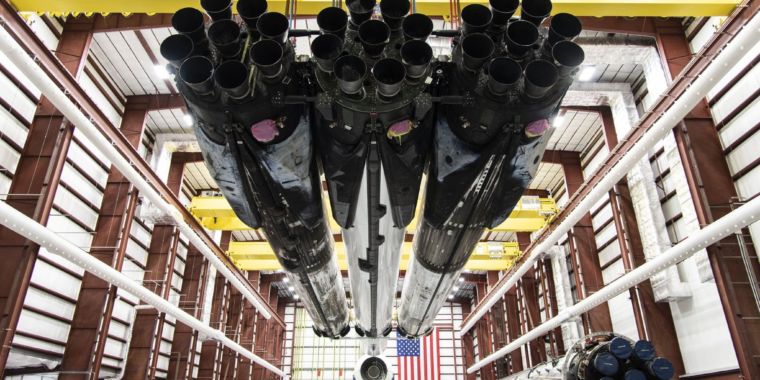
-
The Falcon Heavy rocket is seen in its hangar in Florida before rollout to the launch pad.SpaceX
-
The 3,700 kg Integrated Payload Stack for STP-2 is shown here.U.S. Air Force
-
Monday's flight will involve the lighting of 27 Merlin engines.SpaceX
SpaceX's Falcon Heavy rocket will attempt its most technically demanding mission yet on Monday night, with a rideshare flight organized by the U.S. Air Force. Company founder Elon Musk has characterized the mission as "Our most difficult launch ever."
During this Space Test Program-2 flight, the world's most powerful operational rocket will attempt to deliver 24 different payloads into three different orbits, resulting in multiple re-lights of the Merlin 1D engine powering the rocket's second stage.
It is a critical mission for SpaceX and its Falcon Heavy rocket for a few reasons. First of all, this is the first time the Air Force has flown payloads on a Falcon Heavy rocket. And while this mission will not be carrying anything critical to national security—such as large satellites valued at $1 billion or more used for observation, communication, or other purposes to advance the national interest—Air Force officials will be watching closely.
The U.S. military is in the middle of determining which providers among SpaceX, United Launch Alliance, Blue Origin, and Northrop Grumman will win lucrative launch contracts from 2022 to 2026. The Air Force is only expected to pick two winners, and SpaceX has said its Falcon Heavy rocket can meet all nine of the Air Force's "reference orbits," which means sending heavy payloads to some exotic orbits that require a lot of energy to reach.
The unique profile of Monday night's mission will help demonstrate that the Falcon Heavy rocket's second stage does indeed have the capability to reach all of these orbits. After the rocket launches and its second stage separates, it will perform four separate upper-stage engine burns, and then, almost like a school bus, drop off satellites at three different locations. These maneuvers will require precise performance by the upper stage over the course of six hours.
Testing reuse
Monday night's mission also marks the first time the U.S. Air Force has allowed any of its payloads to fly on previously used rockets. The two side-mounted Falcon 9 cores for Monday's mission previously flew on the Arabsat-6A Falcon Heavy launch in April. The center core for Monday's Air Force flight is new. The two side-mounted cores will attempt to return to a landing site along the Florida coast shortly after launch, and the center core will attempt to land on a drone ship more than 1,200km down range.
The rocket will carry some interesting payloads for several government agencies, including NOAA, NASA, Department of Defense research laboratories, and university research projects. The Air Force's "Space Test Program" organizes launches that "directly enhance the space capabilities of the U.S. and its allies and partners." One of the more intriguing satellites for this launch is a solar sail for The Planetary Society that will seek to demonstrate capabilities first popularized by Carl Sagan.
Liftoff is scheduled for 10:30pm ET Monday night (02:30 UTC Tuesday) from Launch Complex 39A at the Kennedy Space Center in Florida, with a four-hour launch window. The forecast calls for a 70 percent chance of favorable launch conditions. The webcast below should begin about 15 minutes before launch.
Listing image by SpaceX
https://arstechnica.com/science/2019/06/falcon-heavy-rocket-set-to-attempt-spacexs-most-difficult-launch-ever/
2019-06-24 12:35:00Z
52780319697650
Bagikan Berita Ini














0 Response to "Falcon Heavy rocket set to attempt SpaceX’s “most difficult launch ever” - Ars Technica"
Post a Comment